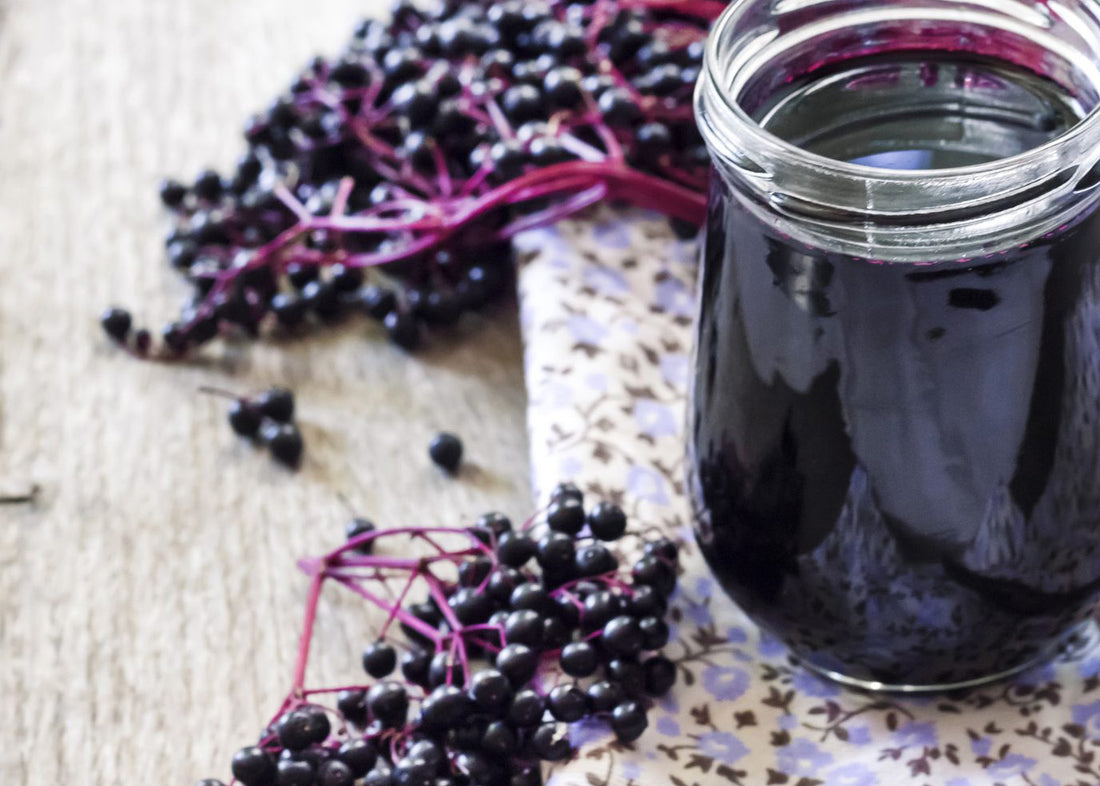
Share
Is Elderberry good for the Immune System?
Countries and cultures the world over try to claim it, but there’s no containing the elderberry. This superfood can have a big impact on your health. It has been used for centuries for a variety of treatments for common ailments. These include pain caused by inflammation, cold and flu symptoms and more.
However, this berry is fickle. It’s crucial to know which parts of the plants are edible and which aren’t. It takes expert handling to prepare it safely. Most people consider the risk to be worth the reward.
So, what is elderberry and what can it do for your immune system?
What is Elderberry?
Elderberry (Sambucus nigra) is a traditional blue-black berry that resembles the shape of a raspberry, except it grows much bigger, sometimes closer to the size of a strawberry. It grows in bunches under a spray of small, white starburst flowers. These flowers grow on trees that can reach 30 feet in height.
The name “elder” likely comes from the Anglo-Saxon word “aeld,” which translates to fire. If you look at an elderberry tree in bloom in late spring, you might just think it’s on fire too!
Elderberry is held in high regard in traditional medicines in various cultures all over the world.
In the Celtic tradition, there are 22 trees in the Celtic tree alphabet, known as the “Ogham Trees.” Each letter/tree is associated with legends, mythical figures, alphabet letters, and lunar months. The Ogham system is one of the oldest alphabets in the British Isles, dating back to the first century.
The Elder tree is assigned the Ogham letter “R,” or “Ruis,” although it is also known as “droman” in Scottish Gaelic. “Ruis” is the name of the 13th lunar month (approx. Nov. 25 to Dec. 25), which is both the darkest month of the year and the herald of a new beginning. Finally, elder flowers are bright white, a color associated with souls and funerary rites, cementing the tree’s close link with the spiritual realm.
Celts used elder products as everything from an insect repellant to a cold remedy.
Inhabitants of West Virginia Appalachia have used elderberry concoctions as cold and flu remedies, syrup, tincture, dye, and more.
Legends of its use also stretch across Native American plains nations, across Asia and even into the fertile river plains of Egypt.
Elderberry itself is very tart, and it is cooked before use in tonics, ointments, juice, jam, wine, and champagne. Many people add sweeteners to recipes such as simple syrup. Elderberry syrup can be used like any other syrup: on pancakes, oatmeal, or even on ice cream!
The elderflower, with its unique scent, can be used in organic teas and poultices. These poultices can sit on achy joints, insect stings, scars, burns, and other closed wounds. The leaves, stems, and bark are rarely used, as mishandling these can make someone sick. More on that later.
What is Elderberry used for?
Across cultures, elderberry is often used to treat the following:
- Colds
- Flu
- Aches and pains
- Burns and rashes
- Cardiovascular health
- Diabetes relief
Elderberry-infused products have safety clearance from the FDA. However, you should always consult your doctor before you begin using any new food or product in association with treatment for serious diseases.
What are the benefits of elderberry?
Elderberries, like any berry, are a part of a healthy diet. Berries contain plenty of essential vitamins, minerals, sugars, and fiber we need to feel our best every day. Without them, we leave ourselves vulnerable. When our immune system is weak, our bodies are susceptible to long-term, chronic, and irreversible damage from stress and illness. Luckily, with a balanced diet and exercise, we can keep our bodies strong.
Elderberries pack a powerful punch:
- They’re high in vitamin C (60% of recommended daily intake).
- They’re high in dietary fiber (more than a fourth of recommended daily intake).
- They’re high in anthocyanins.
Anthocyanins have the suggested benefits of being anti-inflammatory. The use of foods and products containing anthocyanins may help alleviate pain, fever, and swelling associated with the common maladies. This may be why so many cultures have found it useful!
For these reasons, elderberry extract has been tested for it’s antiviral and antimicrobial properties to make colds and flu-like symptoms milder and shorter.
The berry isn’t the only powerhouse here. Elderflowers have also been shown to inhibit the absorption of the enzyme a-glucosidase, which reduces the rate of digestion of carbohydrates.
Along with diet and exercise, this allows those suffering from diabetes to temporarily better control their blood glucose levels, and their hemoglobin levels in the long-term. They may want to try elderflower tea and other elderflower-specific products.
Are there potential risks from consuming elderberries?
Elderberries, like many fruits and vegetables, have parts that are considered inedible, or even poisonous. Bananas have their peels, apples their cores, and coconuts their hard outer shell. If you eat too many carrots, your skin could turn orange. Most people cut off a strawberry’s stem. We could go on.
Consuming any of these, especially at large quantities, unwashed or unripe, is not considered to be part of the experience.
The elderberry is no different. Consumption of elderberry leaves, stems, branches, bark and raw or unripe berries (which contain a toxic substance similar to that within almonds) are not considered edible because they can cause the following:
- Diarrhea
- Nausea
- Vomiting
- Sweating
- Excessive urination
Although some people are interested in elderberry’s diuretic properties, elderberry is not considered a safe laxative. If someone is in need of a laxative, stool softener or diuretic, they should seek out other products, according to the advice of their physician.
The side effects of consuming unripe, unwashed, or raw berries could lead to other complications including dehydration, organ stress, renal infection, flu-like symptoms, erosion of tooth enamel, and other health complications. These are particularly dangerous in individuals with pre-existing health conditions such as diabetes, cardiovascular disease, or kidney infection.
While these are potential side effects of the plant excluding the berries, it is theoretically possible to develop these symptoms, especially if you are allergic to raspberries. However, you would have to consume an incredible amount of cooked berries or flowers to experience the effects listed above. What’s more, cooking, baking, boiling, or otherwise heating the berries breaks down these toxins for safe consumption.
What limits our understanding of the effects of elderberries?
Wisdom across cultures and generations deserves respect. Elderberry’s prominence and perseverance across cultures and history merit our attention, however, our duty to scientific inquiry demands skepticism. So, where do we stand on the issue?
Despite the fact that elderberries seem to be a tried-and-true herbal home remedy, there is limited exhaustive, peer-reviewed research on its properties and effects. This is likely due to the following:
- Human trials are limited and expensive, and without pressure from the consumer base or the scientific community, research is slow to act.
- There is currently no federal standard method for measuring antioxidant or anthocyanin levels in over-the-counter products. This limits our ability to describe their precise effectiveness.
- Processing elderberries into food products, extracts, ointments, etc. can reduce the antioxidant activity or effectiveness in the body, and therefore limits the true measurable potential effects. However, this process is essential to eliminate the toxins in the plant which may otherwise make you sick.
Consumers and researchers must balance our need for remedies, knowledge, and the preservation of history. Elderberries still hold the power of centuries, getting stronger as we cultivate and harvest them, choosing the larger berries, the better flavor, the stronger stalk, all carrying on the elderberry legacy.
Elderberries and you
Elderberries are a great addition to an active and healthy life. They are rich in history, folklore and taste, and can be used in a number of ways. While its most popular use is for a cold and flu remedy, thanks to its anti-inflammatory properties, it can also alleviate pain associated with burns and rashes.
Without proper handling, elderberries can make inexperienced cooks or consumers very sick. However, modern cooking techniques can break down these toxins. Still, only the berry and specific parts of the flower should be consumed, and never the stems or leaves.
A strong and healthy immune system leads to a strong and healthy you! Incorporating elderberry into your life could help to bring out the power already inside you.
Today, that’s easier than ever before. Introducing Atlantic Naturals: Elderberry Immune Complex. This supplement is packed with elderberry, oregano, vitamin C, garlic, asparagus, moringa, and ginger. Through this unique combination, you can experience support to your overall health and help to cultivate a vibrant immune system.
When we were creating our immune complex, it was a no-brainer to include elderberry. In addition to helping you tackle cold and flu symptoms, we know that elderberry supplements would be a great addition to your health regimen.
If you’re worried about the cold or flu, it’s time to partner with elderberry and you!
References
Ulbricht, Catherine, et al. “An Evidence-Based Systematic Review of Elderberry and Elderflower (Sambucus Nigra) by the Natural Standard Research Collaboration.” Journal of Dietary Supplements, U.S. National Library of Medicine, Mar. 2014, www.ncbi.nlm.nih.gov/pubmed/24409980.
Mandl, Elise. “Elderberry: Benefits and Dangers.” Healthline, Healthline Media, 8 Mar. 2018, www.healthline.com/nutrition/elderberry.
Jian, He, and Monica Giusti. “Anthocyanins: Natural Colorants With Health-Promoting Properties.” Annual Review of Food Science and Technology, U.S. National Library of Medicine, 2010, pubmed.ncbi.nlm.nih.gov/22129334/.
Nonymous, A. “European Elder.” National Center for Complementary and Integrative Health, U.S. Department of Health and Human Services, 2016, www.nccih.nih.gov/health/european-elder.


3 comments
I have OA .
people who has diabetes could take this.
would you recommend one of your products that’ll help with asthma symptoms please